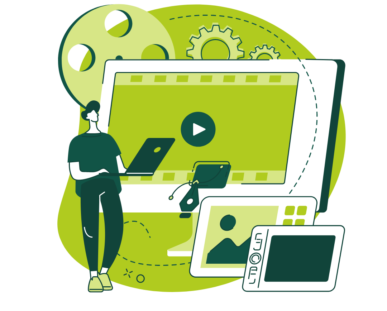![]()
Poznan University of Economics and Business Knowledge Transfer Company
ul. Towarowa 55, 60-995 Poznań
![]()
Poznan University of Economics and Business Knowledge Transfer Company
ul. Towarowa 55, 60-995 Poznań

DiSuDeSME – Digitalisation for sustainable development of SMEs is the project financed by the Erasmus+ European Union program. The main aim of the project is to provide appropriate curriculum on topics related to sustainable Digital Transformation Training Scheme for SMEs.
The project prepares employees of the SMEs for the sustainable digital transformation, improve their skills and competences to accelerate the digital transformation for sustainable development. It also prepares students to participate in protecting the environment and running the company with an appropriate approach.

PR1. The methodology and curriculum – sustainable Digital Transformation Training Scheme for SMEs
Result 1 will be the preparation of a curriculum based on focus groups, using the experience of the project partners. This focus study should provide details of the content of subsequent results and confirm the characteristics of the chosen course.
There will be mapping of requirements towards the innovative and effective training scheme that covers all required topics. The target groups cover:
PR2. Open Educational Resources
Open Educational Resources will be created based on the developed training scheme.
The OERs delivered by the Consortium will consist of the following elements:
OERs will be stored at the educational platform of the Italian Partner
https://erudire.it
Materials will be available for all logged trainees with no charge.


PR3. Self-Assessment tool
Web- based self-assessment tool for the targeted groups will be a method that enables trainees to get known how much they know about topics covered by the curriculum of the training.
Self-Assessment tool will meet the following standards:
PR4. Check-ups
Company check-ups is an activity planned for practical verification of developed solutions, materials, and methodology. It is a guidance on how to use developed methodology in the business practice. One thing is to explore theoretical knowledge, the other to apply the knowledge in practice. Trainees must go through the practical exam on how to use gained information. The check-up should help apply the knowledge. Consortium prepares the methodology of the additional element of the training scheme, that can be used by the business trainers afterwards
Check-up is an interaction activity that involve trainees in a sort of “consultant” for the SME involved.

PR5. Manual and Good Practices Guidebook
The basic target group of the manual and Good Practices Guidebook are:
In particular, the result will improve participants’ abilities:

Poznan University of Economics and Business
Knowledge Transfer Company
ul. Towarowa 55
60-995 Poznań
The European Commission's support for the production of this publication does not constitute an endorsement of the contents, which reflect the views only of the authors, and the Commission cannot be held responsible for any use which may be made of the information contained therein.